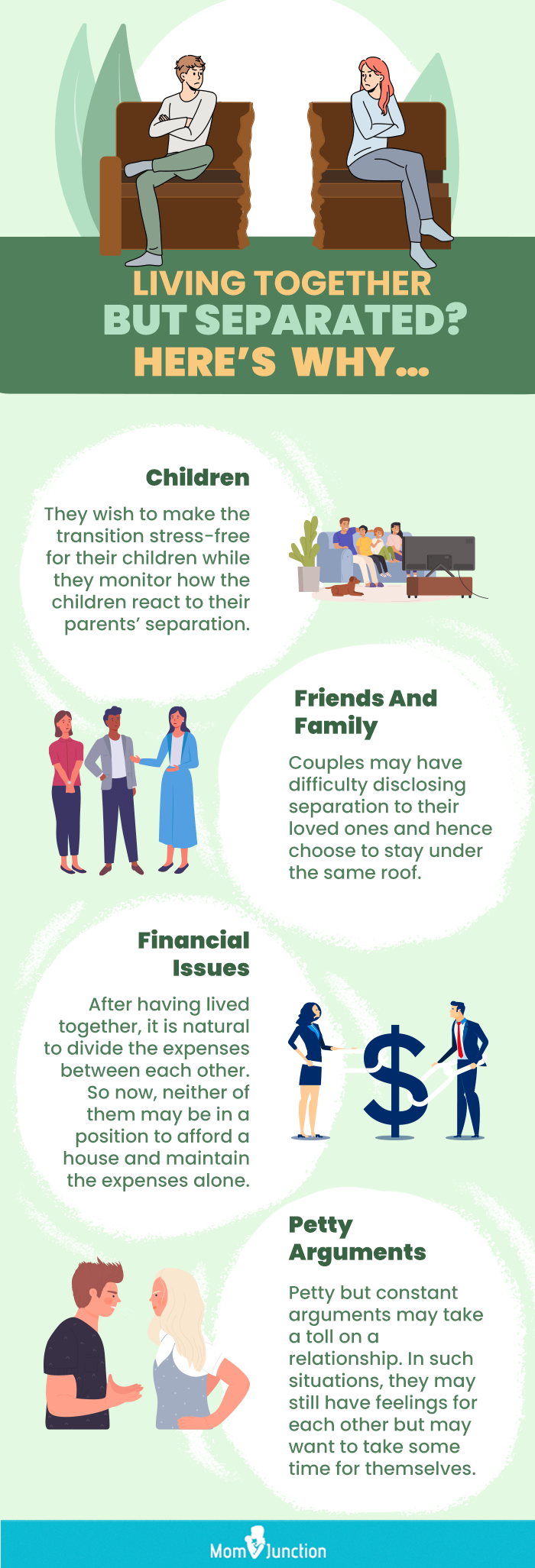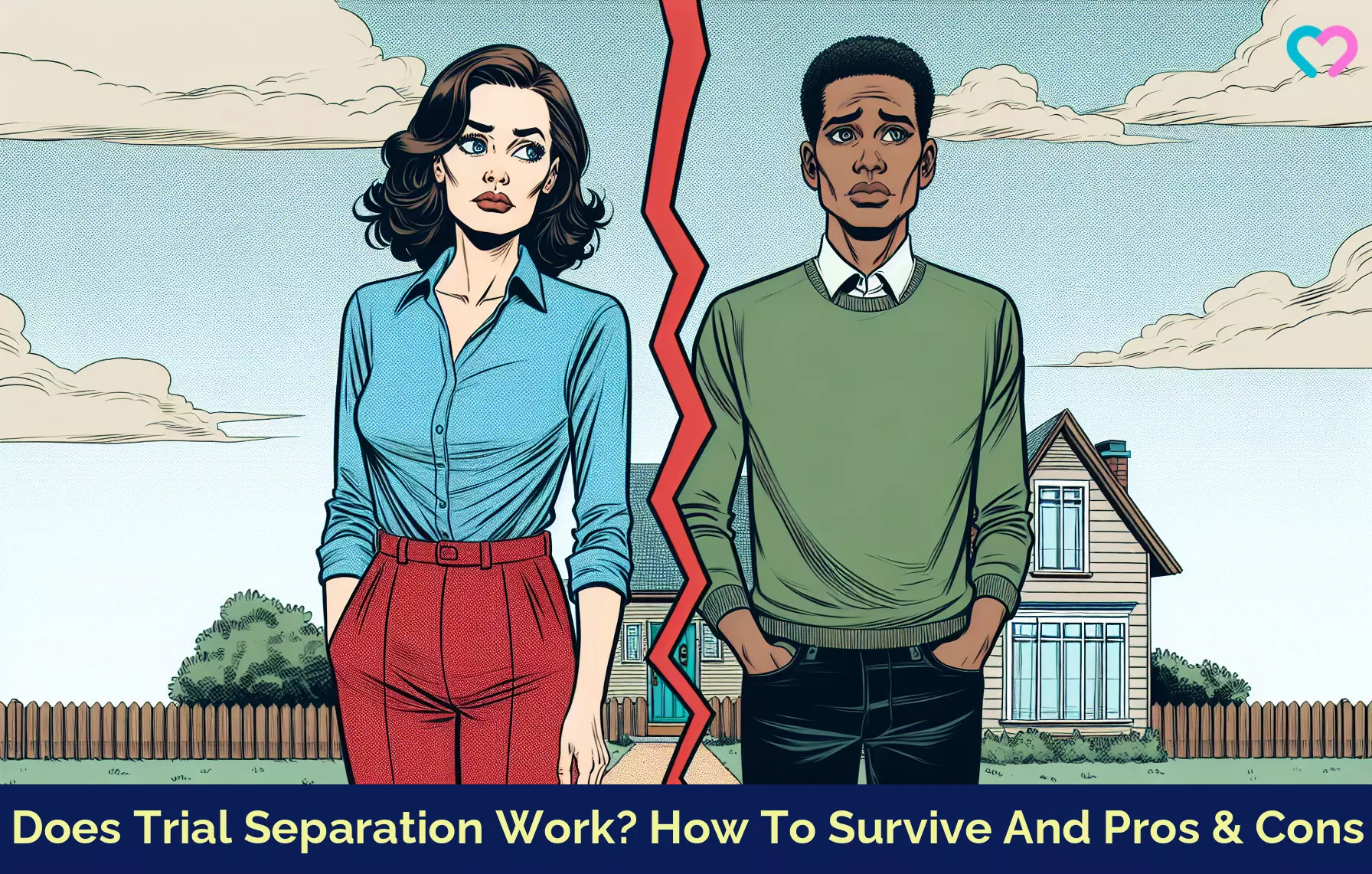
Image: ShutterStock
A trial separation is an agreement or contract between married couples where they take a break from marriage to understand whether separating would make any difference in their partnership or not.
Sometimes, there are troubles in a marriage that cause couples to fight or disagree and cause a commotion constantly. There are times when they wish to separate, but filing a divorce seems like a big and bold step. In such cases, couples can try this separation agreement negotiation before parting ways and ending their marriage.
Keep reading this post to understand what trial separation is and how it works.

Key Pointers
- You may sort finances and living arrangements for yourself and your children during a trial separation.
- Paying extra attention to children’s needs is vital during separation since they can easily become affected by major changes in their lives.
- A trial separation can also give some space for partners to be themselves and sort out their problems and reunite again.
What Is Trial Separation?

It is a non-formal agreement between a married couple to stay separately, away from one another for a while. Taking a break in a relationship can help the spouses get some time alone to declutter their minds and think calmly. A trial separation is usually considered as the first step towards divorce, although the partners could change their minds, negotiating for a reconciliation. Trial separation is informal, unlike legal separation, which involves court proceedings and official documents.
Trial separation could be the right solution when a couple is going through a difficult time together.
During a trial separation, the ownership of the property remains the same. The marital status of the couple also remains the same as before, which means they are still legally married. The terms of separation usually depend on the couple and can be mentioned in the contractual agreement to avoid misunderstandings later. The terms could also include the time that the children spend with each parent.
Trial Separation Checklist: What To Do?
A trial separation may not be as complicated as the final disunion or a divorce, but it still involves certain arrangements that aren’t easy. It is important to know and understand how it works to ensure it goes on smoothly without any major hurdles. Here are some essential points to remember when you are preparing yourself for a trial separation.
1. Sort your finances
If you and your spouse have been married for a long time, then it is likely that your finances are joint. So, when you plan for a trial separation, you need to sort this part in advance.
- Decide who is going to manage specific expenses.
- If a spouse requires monthly maintenance, then fix that amount as well.
- You may have these mutual terms in writing or in an informal pact to avoid any rifts, disputes, misses or mix-ups when you are separated.
 Do remember
Do remember2. Make your living arrangements
You might wonder – can you continue living in the same house during a trial separation? Some couples may decide to live in different places, while others may be separated but living together. That should be decided based on the following points.
- Decide who is staying at home and who is moving out: if both of you are going to live in the same house but in different rooms, or one of you is going to rent a space for a while, and who pays the rent.
- Moving away could be easier if there are no children involved. But if you have children, then you should think about their plight as well before making a choice.
3. Make proper arrangements for your children

When you have children, you have to be extra cautious about making important decisions, for children may experience deteriorated daily functioning with the parents separation.
- If they are too young and the problem between you and your spouse is not major, then you may want to stay under one roof.
- But if you have decided to stay separately, then you should explain to your child or children (if they are old enough to understand) about what is happening. Ensure that there is nothing to worry about.
- Plan such that both the parents get to spend time with the kids.
- Decide where the children are going to stay and who is going to manage their financial responsibilities.
- Establish terms and grounds, put them in writing, and move ahead. Just make sure you are not neglecting your children in any case.
4. Focus on yourself
A trial separation or split is all about disengagement. There is no dependency on each other, so make sure that you have made arrangements for yourself.
- Create a separate bank account, and don’t share your pins or passwords.
- Make a list of important documents such as marriage certificate and financial documents. Get their copies and keep them safe with you.
- You can change the passwords of your social media handles and bank accounts. Keep doing things that can make you independent.
Pros And Cons Of A Trial Separation
A trial separation might give you an idea of what to do with your marriage, but it comes with its pros and cons.
A trial separation can yield surprising and unexpected results. For instance, BG Donovan, a blogger, shares her honest experience when she tried trial separation. She writes, “My bitterness had become like weeds in the garden. They only needed some dirt, sun, and water, and they would grow rampant, taking all of the nutrients from my flowers. Each time Chris did something with selfish intent, it fed the bitterness and helped it grow. I needed to yank the weeds out and throw them away. I also needed to prepare my soil (heart) so that it could not grow anymore. When I asked for a trial separation, I was curious to see how I would feel with him gone… I felt at peace… Every stubborn weed vanished without a trace, leaving my once-neglected garden to thrive and flourish (i).”
Pros

- One of the major advantages of a trial separation is that it gives you some hope to save your marriage, besides the alone time and the much-needed space to think and analyze your relationship. You also get the freedom to look at your life from a different angle. And if there is love between you two, then you might even come up with solutions to restart the relationship on a positive note. You can get back together after separation and work harder on your relationship.
- During a trial separation, you are on your own and can learn about managing finances, household chores, and other responsibilities all by yourself. This helps you confront your insecurities and helps you become independent and strong.
- Trial separation might give you enough time to make sensible decisions. Emotional detachment will help decision-making abilities, and you can think practically.
- You think of a trial separation only because your marriage is not doing well. There are constant fights, arguments, and disagreements. But a little space and time may end all the negativity, and you may be at peace for a while.
- A trial separation is inexpensive compared to other legal procedures. You only have to bear your own expenses and not worry about your spouse’s expenses, unless you agree to it.
- It also prevents you from making hasty decisions that you may regret later. In the meantime, you can go for couple’s counseling. But counseling can be more beneficial if taken before separation.
Cons
- One of the major hassles of a trial separation is breaking the news to the children. Children are very sensitive to stressors on parents, which may transmit distress to them and develop symptoms if not addressed appropriately.
- There is hardly any communication when you are physically separated. Although it is temporary, there is an odd chance that it may become permanent. The gap between the spouses could widen, and they might choose to stay separated.
- There are no financial benefits in a trial separation. If one spouse is unemployed or has limited finances, then they have to either manage it alone or be dependent on their spouse.
- Every couple’s story is different. For some, the trial separation might work well and could lead to a reunion. But for others, it might bring up stronger reasons to get divorced.
 Point to consider
Point to considerHow To Survive A Trial Separation?
Trial separation only gives you some time to make a sound decision, but not necessarily one that favors the relationship. The period of separation itself may be difficult to survive initially, even though it can give you some clarity. Here are a few tips to help you get through it.
1. Establish ground rules
While it is not necessary, a trial separation period might work better with some rules to follow by the spouses. These rules may or may not prevent divorce, but they can minimize the misunderstandings. Have rules for when to communicate and what topics you can talk about (finances, children, etc.) and so on. Both partners should ensure adherence to the rules for the period to get over smoothly.
 Point to consider
Point to consider2. Set the trial separation period
How long should the trial separation last? This is one of the common questions couples may ask. The break should be neither too short nor too long. It is temporary and should last about three to six months, based on what the partners agree. If the time frame is short, you might not be able to think or come to a proper consensus. And if it is too long, then there is a chance that you could get used to staying separate and may eventually want to get divorced.
3. Seek help from outside

If you need help, you may reach out to your parents, family members, or friends. You don’t necessarily need to take care of it all by yourself. Talk to them about your plan and how they can help you get through the period. If you are not comfortable talking to your immediate family or friends, then you may talk to a professional counselor.
4. Evaluate your goals
While one spouse may be leaning towards a happy marriage, the other could be negative and plan a divorce. So before separating, talk to each other and determine if the separation is even necessary. And then, get in touch in between the separation period and know if you both are moving towards a similar goal or in the opposite direction.
5. Communicate openly
Open communication is key during a trial separation. Couples should schedule regular check-ins to discuss their feelings, concerns, and progress, ensuring both partners feel supported and reducing the risk of misunderstandings.
Do You Need A Separation Agreement In A Trial Separation?

Ideally, there is no need to involve courts for a trial separation. The rules of agreement depend on the couple. If you are okay with an oral agreement and come to terms verbally about the living arrangements, finances, and children, then you may go ahead.
But if you are not sure of what might happen and want to be on the safe side, then you can mention every detail in an informal agreement. Both spouses can sign it for approval.
Frequently Asked Questions
1. How long does the average separation last?
An average separation lasts about two to three years, depending on whether the couple gets back together or ends up getting divorced.
2. What should you not do during separation?
Here is a list of things that you should not do while going through a separation:
- Tell other people about it.
- Move out of the house before the final decision.
- Ignore your mental and physical health.
- Jump into a rebound relationship immediately.
3. How do you have a trial separation in the same house?
The list of things that you need to consider while going through a trial separation with your partner staying in the same house include:
- Have a defined set of rules.
- Create a structure of how you will live within the same house as two individuals.
- Discuss parenting responsibilities.
- Have a set timeline for the process.
4. How do you tell your husband you want a trial separation?
Here are some tips on how to ask your husband for a trial separation.
- Think thoroughly before talking to your husband.
- Have a mature conversation and avoid threatening him with a divorce.
- Be calm and put your points clearly.
- Be prepared for his reaction.
- Acknowledge his emotions, but refrain from getting carried away.
5. How many marriages survive a trial separation?
It has been shown that about 87 percent of separations end up in a divorce, while the remaining 13 percent decide to get back together.
6. Should you date during a trial separation?
If you feel that you are free to meet and see other people while you are separated, you may do so. However, don’t rush into a relationship and break your heart again.
7. How can I cope with the emotional challenges of a trial separation?
To cope with emotional challenges during a trial separation, you can seek support from friends, family, or a therapist. Journaling can help process your feelings, while self-care and focusing on personal growth are essential for healing.
A trial separation involves an informal separation of married couples that usually extends for three to six months. The motive is to give each other space and time to rethink their decision about divorce. It is wise to pen down the terms and conditions to avoid misunderstandings during this period. It is crucial when children are involved as they are more vulnerable to negativity. You can reach out to family members or friends and need not handle everything alone. Think clearly and take suggestions from people, but remember that the final decision is all yours.
Infographic: What Are The Reasons For A Trial Separation In The Same House?
Living in the same house but separated? Although it may not be too familiar, certain situations may compel a couple to share the same roof while trying a separation. While distancing physically and maintaining a boundary during a trial separation is preferred by most, others may opt to live together during the process. Give this infographic a read to know why. Illustration: Momjunction Design Team
Illustration: Does Trial Separation Work? How To Survive And Pros & Cons

Image: Dall·E/MomJunction Design Team
Does trial separation really work? Watch this video to explore the pros and cons of taking a break from a relationship.
Personal Experience: Source
MomJunction articles include first-hand experiences to provide you with better insights through real-life narratives. Here are the sources of personal accounts referenced in this article.
i. My husband announced our separation on Facebook.https://medium.com/@9pinetreedrive/my-husband-announced-our-separation-on-facebook-73d9c53364ab
Recommended links
- Divorce Decree: What Is It And When Is It Issued?
- What Are The Grounds For Dissolution Of Marriage?
- How To Tell Your Husband You Want Divorce
- 11 Ways To Rebuild Your Life After Divorce
Community Experiences
Join the conversation and become a part of our nurturing community! Share your stories, experiences, and insights to connect with fellow parents.
Read full bio of Dr. Carlos Juan Carmona-Goyena
Read full bio of sanjana lagudu
Read full bio of Shikha Thakur
Read full bio of Ratika Pai
















